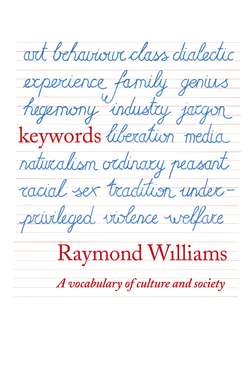Читать книгу Keywords: A Vocabulary of Culture and Society - Raymond Williams - Страница 22
CAREER
ОглавлениеCareer is now so regularly used to describe a person’s progress in life, or, by derivation from this, his profession or vocation that it is difficult to remember, in the same context, its original meanings of a racecourse and a gallop – though in some contexts, as in the phrase ‘careering about’, these survive.
Career appeared in English from eC16, from fw carrière, F – racecourse, rw carraria, L – carriage road, from carrus, L – wagon. It was used from C16 for racecourse, gallop, and by extension any rapid or uninterrupted activity. Though sometimes applied neutrally, as of the course of the sun, it had a predominant C17 and C18 sense not only of rapid but of unrestrained activity. It is not easy to be certain of the change of implication between, for example, a use in 1767 – ‘a … beauty … in the career of her conquests’ – and Macaulay’s use in 1848 – ‘in the full career of success’. But it is probable that it was from eC19 that the use without derogatory implication began, especially with reference to diplomats and statesmen. By mC19 the word was becoming common to indicate progress in a vocation and then the vocation itself.
At this point, and especially in the course of C20, career becomes inseparable from a difficult group of words of which WORK, LABOUR (qq.v.) and especially job are prominent examples. Career is still used in the abstract spectacular sense of politicians and entertainers, but more generally it is applied, with some conscious and unconscious class distinction, to work or a job which contains some implicit promise of progress. It has been most widely used for jobs with explicit internal development – ‘a career in the Civil Service’ – but it has since been extended to any favourable or desired or flattered occupation – ‘a career in coalmining’. Career now usually implies continuity if not necessarily promotion or advancement, yet the distinction between a career and a job only partly depends on this and is often associated also with class distinctions between different kinds of work. On the other hand, the extension of the term, as in ‘careers advice’, sometimes cancels these associations, and there has been an American description of ‘semi-skilled workers’ as having a ‘flat career trajectory’.
It is interesting that something like the original metaphor, with its derogatory C17 or C18 sense, has reappeared in descriptions of some areas of work and promotion as the rat-race. But of course the derogatory sense is directly present in the derived words careerism and careerist, which are held carefully separate from the positive implications of career. Careerist is recorded from 1917, and careerism from 1933; the early uses refer to parliamentary politics.
See LABOUR, WORK
